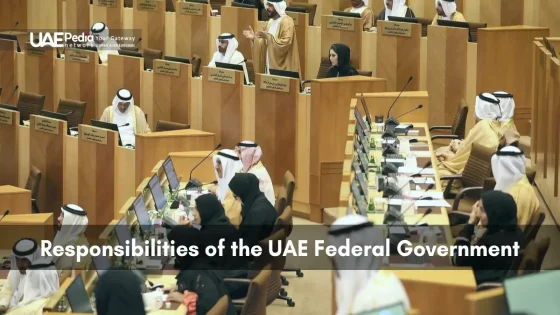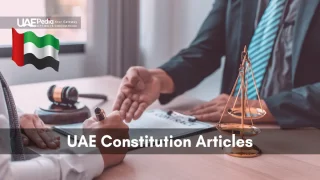How does a young nation balance tradition with modernity in its supreme law? The United Arab Emirates, a federation of seven distinct emirates, shows this balance. It was formed in 1971 and has a Constitution with 152 articles.
Did you know the UAE ranked first in the MENA region on the ‘Rule of Law’ 2022 Index? This shows its strong legal system.
UAE Constitutional Framework and Foundational Elements
The UAE Government’s rules make up the nation’s legal base. These rules guide how the country is run. They also shape the UAE’s special federal system.
Formation and Federal Structure of the UAE
The UAE is made up of seven emirates. These are Abu Dhabi, Ajman, Dubai, Fujairah, Ras al-Khaimah, Sharjah, and Umm al-Quwain. Each emirate has a lot of freedom to make its own decisions.
The Federal Supreme Council is the top group in the UAE. It has the rulers of the seven emirates in it.
Constitutional Provisions and Core Articles
The UAE Constitution sets out the rules for the government. It divides power into three main areas: the executive, legislative, and judicial. There are federal and emirate areas too.
The Cabinet of the UAE has 22 members. They handle both internal and foreign affairs. They follow the Constitution’s rules.
Rights and Freedoms Under the Constitution
The UAE Constitution protects certain rights and freedoms for its people. It says justice, equality, and the rule of law are key. The government has worked to improve its political system.
In 2006, the UAE started letting people vote for the Federal National Council. This was a big step forward.
| Constitutional Element | Description |
|---|---|
| Federal National Council | 40 members (20 elected, 20 appointed) |
| Political Parties | Banned in the UAE |
| Government System | Federal presidential elected monarchy |
| Emirate Autonomy | Substantial, with influence reflected in federal positions |
Legal Hierarchy and Implementation of Constitutional Powers
The UAE’s legal system is a mix of civil law and Islamic Shari’ah. This mix makes a special way to govern. It helps in using constitutional powers at different levels.
Federal Laws and Legislative Authority
Federal laws are key in the UAE’s law-making. They cover important national topics. For example, the UAE Civil Code talks about contracts in Article 257.
It says contracts need both sides to agree.
Presidential and Cabinet Authorities
The President and Cabinet have a lot of power. They can make laws quickly when needed. This is between Supreme Council meetings.
Role of Federal National Council
The Federal National Council helps make laws. It has 40 members. Half are elected, and half are chosen by emirate rulers.
This way, all emirates have a say in the national law-making.
Emirate-Level Governance Structure
Each emirate has its own way of governing. They have local laws that work with federal ones. This system balances national unity with local freedom.
| Legal Entity | Function | Example |
|---|---|---|
| Federal Laws | Regulate national matters | UAE Companies Law |
| Decrees by Law | Urgent legislation | Emergency economic measures |
| Federal Decrees | Executive decisions | Appointment of officials |
| Cabinet Resolutions | Implement policies | Visa regulations |
Conclusion
The UAE’s laws are a shining example in the Middle East. It has a strong legal system and a forward-thinking government. This makes it a top place for rules and justice.
The UAE keeps making its laws better. For example, a new law lets foreign companies own land in the UAE. This helps the economy grow and attract more investors.
Constitutional courts are key in keeping laws fair. The UAE is number one in the MENA for this, according to a 2022 index. A big change in 2018 made the financial rules clearer and more open.
Learning about laws is important for everyone. The UAE’s Ministry of Justice now offers most services online. This makes it easier for people to find legal information.
The UAE is great at solving disputes. The Federal Supreme Court helps settle issues between states and the government. This system makes sure problems are solved well, showing the UAE’s legal strength.


















